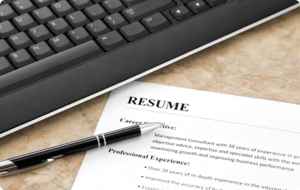- FEATURED IN :

What are Interpersonal Skills?
Interpersonal skills are specific soft skills that focus on your ability to relate, communicate and work with other people. Think of it as the traits you use to interact with others: communication, teamwork, leadership, following directions, cross-collaboration.
Like all soft skills, they’re hard to quantify or prove. Whereas it’s easy to demonstrate that you have a hard skill, e.g., speaking a foreign language, soft skills are harder to show.
For example, one of the primary interpersonal skills is teamwork. It’s evident that teamwork is an important part of working at most companies, but unlike a hard skill, it’s a bit trickier to show or prove you’re good at it.
The reason it’s important to notice the difference between hard skills and soft skills is because the best strategy to use for your resume is to include a mixture of both!
Now, we’re going to introduce some of the main interpersonal skills that employers tend to look for and then give you some advice on how to include them in your job application.
Types of Interpersonal Skills
Interpersonal skills is an umbrella term that encompasses many nuanced approaches to personal interaction. Let’s outline and explain some of the top interpersonal skills employers tend to seek:
Main interpersonal skills
Communication is the core of all human interaction. It can be written or oral communication that determines your abilities to write emails and messages and speak on calls, during meetings with colleagues, or with clients.
Conflict Management
This is vital for leadership positions because properly executing conflict management can prevent problems from disrupting work, keep employee morale up, and prevent turnover. People good at conflict management excel in active listening, mediation, and problem-solving.
Empathy
Empathy is an essential tool that helps people relate to each other and understand different viewpoints. Greater empathy can reduce conflict and stress, which are all important things that companies look for.
Leadership is an important quality to have when you’re applying for a managerial role at any company. Good leaders are necessary to keep their employees happy and motivated while driving progress toward company goals.
Listening
This may be one of the most undervalued skills that someone can possess, but many employers know that good listening skills make for effective and efficient employees. You could go as far as to describe your listening as “active” to let employers know that you pay attention and get things right the first time.
Negotiation
Negotiation is a crucial skill for business, financial and sales-related roles because your ability to strike a deal in those fields translates directly to how much money a company makes. Negotiation skills can be the driving force of a business.
Positive Attitude
Never doubt the power of a good disposition. If customer service is required or company culture seems important to the place you’re applying to, don’t hesitate to let them know you’ll be a willing and eager worker. Many hiring managers seek out upbeat workers knowing that they’ll be dedicated employees.
Teamwork
Most jobs are going to require some level of teamwork or collaboration. So, this is a quintessential interpersonal skill that will benefit you to include somewhere on your resume. Employers need to know that you’ll fit with the team that you’re joining.
Other top interpersonal skills
Here’s a list of additional interpersonal skills that are also in high demand, depending on the role:
- Active listening
- Behavioral skills
- Caring
- Collaboration
- Comforting
- Communication
- Conflict management
- Conflict resolution
- Constructive criticism
- Consulting
- Counseling
- Creative thinking
- Customer service
- Developing rapport
- Diplomacy
- Diversity
- Encouraging
- Flexibility
- Group facilitating
- Helping others
- Humor
- Inquiry
- Inspiring trust
- Instructing
- Interviewing
- Leadership
- Listening
- Mediating
- Mentoring
- Motivation
- Negotiating
- Networking
- Nonverbal communication
- Persuasion
- Patience
- Positive reinforcement
- Problem-solving
- Public speaking
- Relationship management
- Respect
- Responsibility
- Sensitivity
- Social skills
- Sympathy
- Teamwork
- Tolerance
- Verbal communication
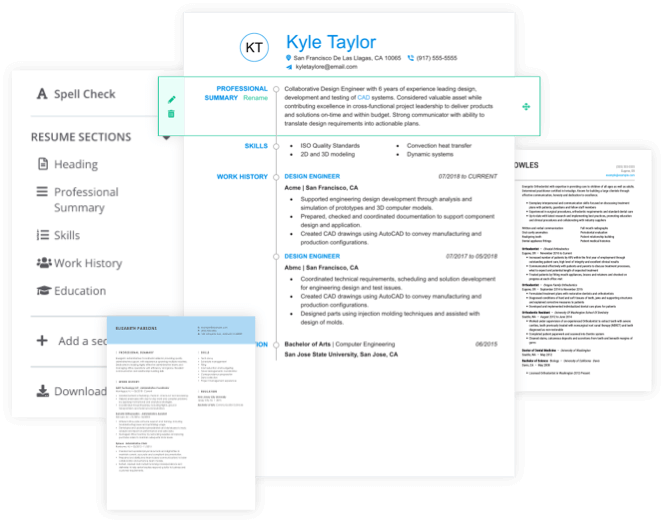
How to Showcase Interpersonal Skills
Here we’ll outline the process you should follow to include skills on your resume. You’ll also need to talk about them in your cover letter and –– fingers crossed, if all goes well –– your interview!
In all three cases, here’s the process you’re going to follow to know which skills to include:
The job description is where employers will tell you what skills they seek in a serious candidate. You must tailor your resume and cover letter to what the company is looking for every time you apply for a job! You don’t want generic hiring documents. You want to speak to each employer’s needs.
Once you’ve looked over some of the skills and duties the employer is seeking, consider your employment history and what experiences you have to draw on that would help you show this potential employer why you’re an excellent fit for the job! Try to use the same phrasing listed in the job description to show that you pay close attention and help pass an applicant tracking system (ATS).
Interpersonal skills on your resume
There are two ways to feature skills in your resume; the easiest is to have a “Skills” section and list them. The other is to include them in the descriptions of your work experience and achievements. For example, instead of just listing the skill “communication,” you could choose to feature it in bullet points detailing your work history, such as “Facilitated brand innovation through cross-functional communication.”
We cover all the places that you can include interpersonal skills on your resume and the best ways to do it in our guide, How to Write Skills.
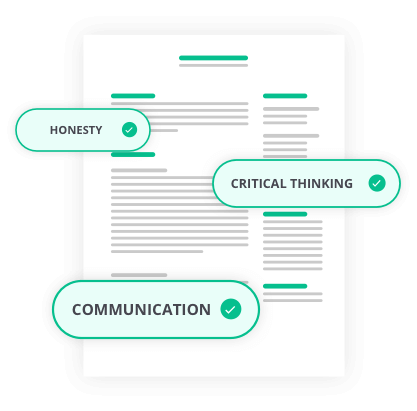
Furthermore, JobHero also features an incredible Resume Builder that makes it even easier to create a resume because it saves you time creating the design and effort by suggesting key skills to include based on the job that you’re applying to.
Our builder was created by our resident career experts to target the job that you’re applying to with best use phrases and relevant keywords.
It can take a lot of stress out of the process and save you a lot of time. So, don’t miss out on the job you want –– use our builder to get moving on your application process!
Interpersonal skills in your cover letter
Keep in mind that your resume is not the only place that you can mention your skills! You should also mention skills that you couldn’t address in your resume space in your cover letter.
Especially in that first paragraph of your cover letter, skills can be a great way to describe yourself.
Also, in the second paragraph of a cover letter, if you don’t have an achievement, you want to discuss, telling a story about how you use your skills in practice could be an effective way to impress an employer!
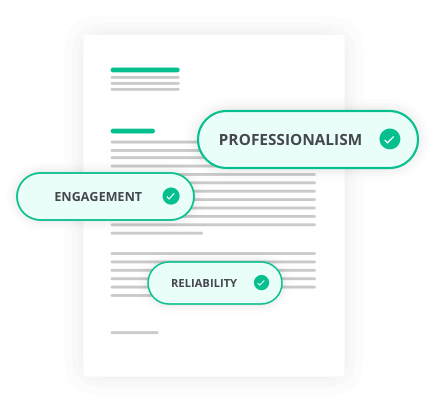
If you’re still not sure what to write, you should check out JobHero’s Cover Letter Builder. It was created to save you time and effort creating your letter.
It can make your life a lot easier because it tailors your cover letter to the job that you’re applying for. Not only does it automate the process of creating a letter, even better, it suggests sentences and phrases that you can customize to describe your experience and how you put your interpersonal skills to good use!
Interpersonal skills in an interview
If you’ve managed to get your foot in the door with an interview, congratulations!
We’ve got some good strategic pointers for how to discuss your skills in an interview.
The main thing to keep in mind regarding discussing skills on a resume versus in an interview is that the interview is expected to be a long-form explanation.
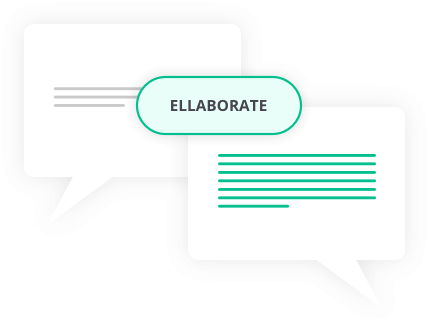
When you appear for the interview, the employer needs the whole story. You’re going to need to justify your skills by explaining a little more in-depth how you put them to good use. That way, an employer can better evaluate how sharp your skills are.
Don’t list your skills. Elaborate!
One easy mistake that people sometimes make in interviews is to present themselves by memorizing and regurgitating the same information listed on their resumes.
While your resume is meant to be a quick list of your accomplishments, your interview will need to fill the rest of the story with more detail and a sense of career progression.
It will be a lot more impactful, and the employer will be more likely to believe you and want to hire you if you convince them why with a story that illustrates your skills in action!
After all, it’s one thing to claim that you’re good at something; it’s a step beyond to tell a story that illustrates why.
For example, someone applying for a role as a teacher could provide an answer to a common prompt like: “Tell me about yourself.”
“In the classroom, my skills in leadership are what I use to get my students motivated, focused, and on-task. Behind the scenes, I’m a big proponent of cross-collaboration among the faculty and teamwork to develop a curriculum that inspires our students and increases our school’s overall standardized test performance.”
Note how in the example, the candidate has validated the claims of their skills by giving evidence.
Try to employ a similar tactic to discuss your top skills!
It could help if, before the interview, you look at the top skills that you mentioned in your resume and think about the best example, story, or anecdote that you could discuss.
Keep these skill illustration stories fresh in your mind for the interview so that you can impress an employer by justifying the claims you make about yourself.
How to Improve Your Interpersonal Skills
People have written thousands of books and held countless seminars on this topic because there are so many ways that it’s possible to improve your interpersonal skills and hone your strengths.
Plus, interpersonal skills will not only better your work life but also your friendships and familial relationships.
Obviously, with interpersonal skills, the key to improving will be to gain more positive experience working with people in groups.
It may be a skill many of us got a little rusty at during the pandemic!
Starting a new job is always an impactful way to dedicate yourself to better relate to new people. Of course, if you’re in the job hunt process, there are other ways that you can find practice.
It can begin at home with your family members, housemates and neighbors. It could also be done in other group settings like volunteer opportunities or sports teams.
Studies have shown that the core two skills that will make you successful in better interacting with others are your active listening and empathy skills. Both will help you better understand what kind of information or emotional response someone needs from you.
That will, in turn, snowball into all of your relationships!
After all, usually, we understand what we want in the interactions that we have with others. We understand what we want. So, the first and biggest step is to understand better what the people around you need.
Related Articles



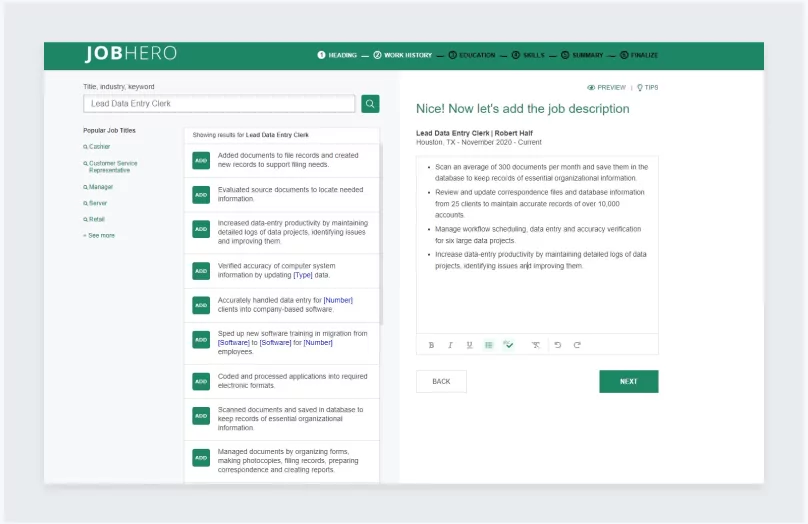
 Read the job description carefully.
Read the job description carefully. Match your skills to the job description.
Match your skills to the job description.
